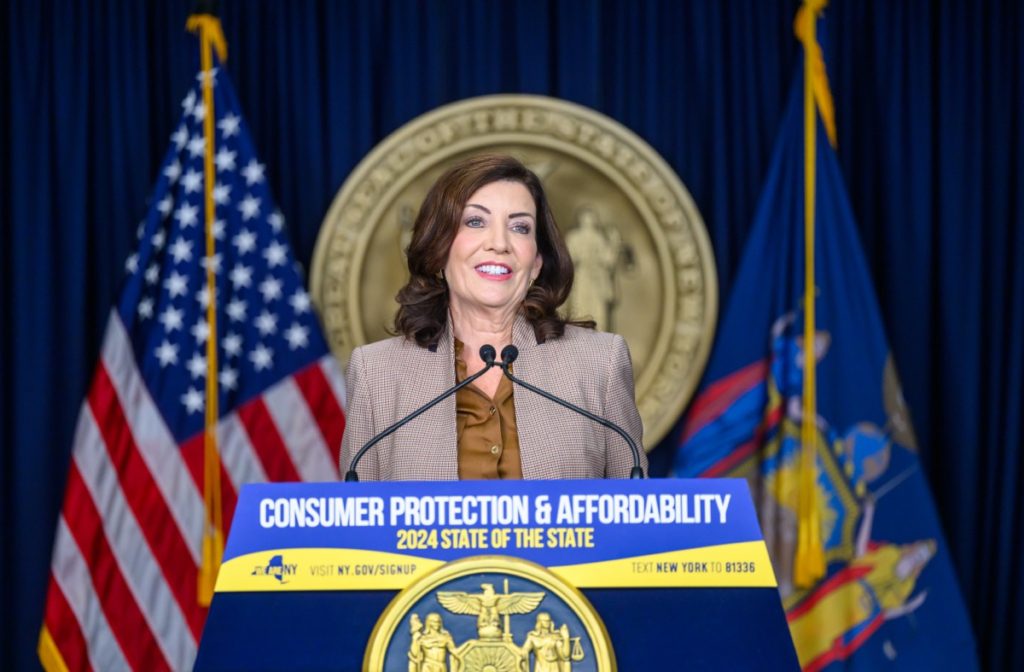Governor Hochul Unveils First Proposal of 2024 State of the State: The Consumer Protection & Affordability Agenda
Governor Kathy Hochul this week unveiled a sweeping consumer protection and affordability agenda, the first plank of her 2024 State of the State. Governor Hochul announced proposals to amend New York’s consumer laws to strengthen consumer protections against unfair business practices; establish nation-leading regulations for the Buy Now Pay Later loan industry; advance the first major increase in paid medical leave benefits in more than three decades; implement the nation’s most wide-ranging proposal to eliminate co-pays for insulin on certain insurance plans; and propose legislation to combat medical debt. Governor Hochul announced these proposals just one day after New York’s minimum wage increase took effect.
“The first plank of the 2024 State of the State is our Consumer Protection & Affordability Agenda – one that combats the effects of illness, disability, unfair business practices and low wages,” Governor Hochul said. “If the last two years have been about putting more money in New Yorkers’ pockets, this year is about keeping it there and that starts with safeguarding people’s hard-earned cash.”
Strengthening Consumer Protections
Governor Hochul has proposed actions to strengthen consumer protections across New York State through the most significant expansion of consumer laws since 1980. While current law protects New Yorkers against deceptive business practices, New York is one of only eight states in the nation whose law fails to protect against unfair and abusive business practices. Amendments to expand consumer protection laws will transform how New York protects consumers, enhance the Attorney General’s ability to enforce consumer protections, and give the State additional tools to pursue bad actors.
Governor Hochul will also propose legislation to require Buy Now Pay Later providers to get a license to operate in the state, and to authorize the New York State Department of Financial Services to propose and issue regulations for this rapidly growing industry. New Yorkers are increasingly turning to Buy Now Pay Later loans as a low-cost alternative to traditional credit products to pay for everyday and big-ticket purchases. This legislation and regulations will establish strong industry protections around disclosure requirements, dispute resolution and credit reporting standards, late fee limits, consumer data privacy, and guidelines to curtail dark patterns and debt accumulation and overextension.
Expanding Paid Medical and Disability Leave Benefits
Governor Hochul announced a plan to increase the maximum benefit for paid medical and disability leave for the first time in 35 years. Under the plan, the Governor will propose an amendment to the disability law to increase the maximum weekly benefit over the next five years and tie it to the Statewide Average Weekly Wage (SAWW). To match the paid family leave benefit, for the first 12 weeks of medical leave, eligible employees would receive 67 percent of their average weekly wage, capped at 67 percent of the SAWW, once fully phased in after five years.
The maximum paid benefit available to New Yorkers who need time off from work to address their own health needs, including for any pregnancy-related conditions, has been capped at $170/week since 1989. Strengthening medical leave will not only support women and parents, but also the nearly 1 in 5 New Yorkers with a disability, who often need leave from work to manage disability-related health needs.
Eliminating Co-Pays for Insulin
Governor Hochul announced a proposal to eliminate insulin cost-sharing completely through proposed legislation. This proposal will enact the most expansive prohibition against insulin cost-sharing in the nation, providing financial relief to New Yorkers and improving adherence to these life-saving medications. With 1.58 million New Yorkers diagnosed with diabetes, the proposal is estimated to save New Yorkers an estimated $14 million in 2025 alone.
According to the American Diabetes Association, people with diabetes have medical expenses that are 2.3 times higher than people who do not have diabetes and the impact is even larger for communities of color, which face disproportionately high diagnosis rates.
Combating Medical Debt
Governor Hochul will also introduce legislation to update and expand New York’s hospital financial assistance law to better protect New Yorkers from medical debt. This legislation would include bold action to protect low-income New Yorkers from medical debt lawsuits by limiting hospitals’ ability to sue patients earning less than 400 percent of the Federal Poverty Level ($120,000 for a family of four). The legislation would also expand hospital financial assistance programs for low-income New Yorkers, limit the size of monthly payments and interest charged for medical debt and implement other protections to improve access to financial assistance and mitigate the deleterious effects of medical debt on New Yorkers.
More than 700,000 New Yorkers have medical debt in collections. Individuals with medical debt are less likely to seek necessary medical care and report being forced to cut back on critical social determinants of health, including food, heat, and rent. As a result, substantial debt levels threaten not only the financial stability of many individuals and families, but also undermine the State’s commitment to improving health equity and health outcomes.




















